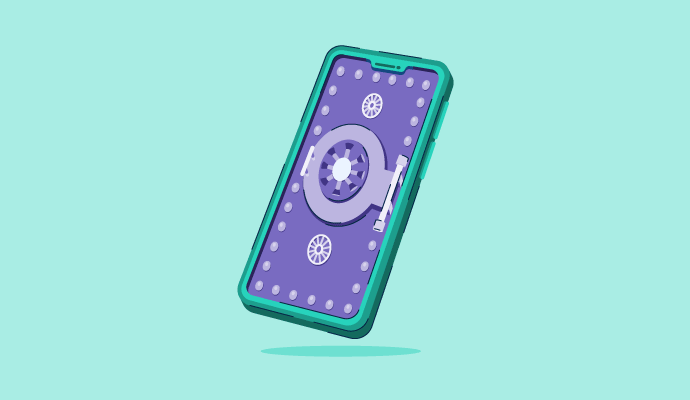December 22, 2024
 by Holly Landis / December 22, 2024
by Holly Landis / December 22, 2024

If you’ve noticed your phone acting strangely–apps crashing, battery draining faster than usual, or unfamiliar pop-ups–it’s natural to wonder "is my phone hacked?"
Of course, hackers can hack your phone if it's not properly secured. While modern smartphones come with built-in security features, they still have vulnerabilities that hackers can exploit.
With how much personal information we store on our smartphones, from photos and messages to passwords and financial details, the idea of someone gaining access to all of it can be unsettling. If you think your phone might be hacked, read on.
If you rely on your phone for business or other confidential activities, it may be a good idea to consider looking into mobile data security software. This software helps identify threats and secures your data with authentication and third-party app limitations.
In this article, we’ll help you identify the signs that your phone may have been hacked, what those odd behaviors could really mean, and how you can protect yourself from hackers.
Here are the top signs to watch for to detect if your phone has been hacked:
As you saw earlier, a number of signs could point to a hacked phone. While these aren’t foolproof signals or exclusive to hacking, you can monitor your device for suspicious or unusual behavior in several ways. Let's look at each of them in detail:
Unusually high phone bills, particularly with high data usage, can indicate hacking. This could mean that your phone has been sending unauthorized communications outside of normal usage for your device. Mysterious calls or texts in your log history might be a warning sign, too.
If your phone has been hacked, you may notice new apps showing up on your device that you didn’t install yourself. This can be especially problematic if hackers have done this, as these apps are able to install malware on your device.
If apps you normally use start misbehaving or regularly freeze, it’s worth investigating whether your phone has been hacked. You should also look at the settings of your current apps. Long loading, opening, or closing times could signal that preferences have been updated without your knowing.
Unexpected, uncommon notifications or pop ups that appear on your device could also be a sign of hacking. Look for unusual password resets or account signups that use your phone to verify them, such as two-factor authentication texts being sent to your phone.
If you find yourself unable to login to accounts that you can usually access easily via your phone, you may have been hacked and your credentials may have been changed. For instance, being locked out of social media or email accounts could suggest that hackers have managed to get to these accounts via your phone and then updated the password to keep you out.
A sudden or rapid battery drain, or if your phone gets unusually hot, could signal a compromised phone. Hidden apps or malicious software (such as cryptojacking, where hackers use your phone to mine cryptocurrency) may be running in the background, consuming resources and draining the battery.
Phones that overheat without heavy usage could also indicate hacking. If your phone gets unusually hot, even when you're not using it much, hackers may be running demanding processes like cryptomining, overworking your phone’s CPU and causing it to overheat.
If your phone suddenly feels much slower than usual, it could be a result of malicious software running covertly. Hacked phones often have programs running in the background that consume system resources, slowing down performance. If apps are lagging, or your phone is freezing often, it’s a sign that something isn’t quite right.
Receiving strange or unfamiliar text messages or calls that you didn’t initiate can also suggest that your phone has been hacked. Hackers may use your device to send phishing messages to your contacts or make calls without your knowledge.
If you’re concerned that you’ve become a victim of phone hacking and want to remove hacker from your phone, take these steps.
Whether you’ve experienced phone hacking or not, you should know how to protect yourself.Taking proactive steps ahead of time can save you from all the stress of getting hacked. Here are some tips to stop someone from hacking your phone again.
Security patches are often released in phone updates, so verify that you’re running the latest operating system for your smartphone and install all updates as they come up. This prevents malware attacks.
With so many logins to remember these days, it’s easy to fall back to using the same credentials at several different places online. But this stands as one of the easiest ways for hackers to gain access to your most important accounts. Instead, consider using a password manager that generates strong, unique passwords for each of your logins, while also keeping them safe without you having to remember them.
Particularly when you’re working on your phone in public, try to keep your Bluetooth usage to a minimum. Hackers may try to access your device by connecting via Bluetooth when you’re in a coffee shop, restaurant, or subway station. Disable it on your phone when you’re not using it, or update your settings to only allow authorized devices to connect.
Charging at a public charging point seems simple and easy, hackers have been known to perform “juice jacking.” They install destructive software onto the charging point itself in order to steal your information when you plug in your device.
Instead, purchase your own portable chargers that you can power up ahead of time or use batteries to boost your phone on the road.
When you need to download a new app, stick with trusted and legitimate sources like the app stores for your device. They have measures in place to monitor for malware to keep users safe.
Public Wi-Fi networks are convenient but can also be unsecured, leaving your device vulnerable to hackers. Use a VPN (Virtual Private Network) whenever you connect to public Wi-Fi to protect your data from being intercepted. A VPN encrypts your internet traffic, making it much harder for hackers to spy on your activity, even on an open or unsecured network.
Now, if you are wondering how did you get hacked in thhe first place, there are numerous ways it can happen. Even devices that claim to keep you safe from outside threats have vulnerabilities at their core that hackers can peel away to bypass built-in security settings.
Some of the most common techniques that hackers use are:
The results of having your phone hacked can range from simple annoyance to financial and identity loss. It’s a serious problem that we all need to be aware of, but taking steps now to protect your mobile data will save you the nightmare of dealing with hacking in the future.
Keep your mobile data safe with the best practices for mobile security.
Holly Landis is a freelance writer for G2. She also specializes in being a digital marketing consultant, focusing in on-page SEO, copy, and content writing. She works with SMEs and creative businesses that want to be more intentional with their digital strategies and grow organically on channels they own. As a Brit now living in the USA, you'll usually find her drinking copious amounts of tea in her cherished Anne Boleyn mug while watching endless reruns of Parks and Rec.
What is web security? Web security, synonymous with “cyber security,” is a broad category of...
 by Amanda Hahn-Peters
by Amanda Hahn-Peters
As technology becomes more advanced, every day brings new ways to work, play, and interact...
 by Mara Calvello
by Mara Calvello
What if someone could waltz into your house whenever they pleased?
 by Ananya Mallya
by Ananya Mallya
What is web security? Web security, synonymous with “cyber security,” is a broad category of...
 by Amanda Hahn-Peters
by Amanda Hahn-Peters
As technology becomes more advanced, every day brings new ways to work, play, and interact...
 by Mara Calvello
by Mara Calvello


